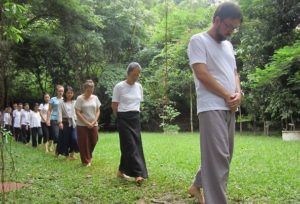Improve Stress Related Disease Symptoms with Mindfulness in Nature
By John M. de Castro, Ph.D.
“Nature is always here and now. Your breath, your senses, anything around you. When you are being aware of the life within you and around you, you are being mindful of this present moment, and it will always calm you down. You can not do nature, you can just be there. Being is calming.” – Hanne Suorza
Stress is an integral part of life. People often think of stress as a bad thing. But, it is actually essential to the health of the body. In fact, we invest time and resources in stressing ourselves, e.g ridding rollercoasters, sky diving, competing in sports, etc. We say we love a challenge, but, challenges are all stressful. So, we actually love to stress ourselves. In moderation, it is healthful and provides interest and fun to life. If stress, is high or is prolonged, however, it can be problematic. It can significantly damage our physical and mental health and even reduce our longevity, leading to premature deaths. So, it is important that we develop methods to either reduce or control high or prolonged stress or reduce our responses to it.
Mindfulness practices have been found routinely to reduce the psychological and physiological responses to stress. It has long been reported that walking in nature elevates mood. It appears intuitively obvious that if it occurred in a beautiful natural place, it would greatly lift the spirits. But, there is little systematic research regarding these effects. It’s possible that conducting walking meditation in nature might potentiate the effects by combining two mood enhancing practices.
In today’s Research News article “.” (See summary below or view the full text of the study at: https://www.ncbi.nlm.nih.gov/pmc/articles/PMC5800236/ ), Corazon and colleagues recruited adult patients with stress-related diseases who had been not able to work for at least the last three months. They were randomly assigned to receive either a mindfulness nature-based therapy or Cognitive Behavioral Therapy (CBT). The mindfulness nature-based therapy occurred 3 times per week for 3 hours each session for 10 weeks and consisted “of five interrelated components: (i) individual therapeutic conversations based on CBT; (ii) individual and group mindfulness exercises, such as mindful walking in the garden; (iii) individual and social gardening activities, depending on the season, which integrates training in mindful awareness; (iv) individual relaxation and reflection time in the garden; and (v) homework to practice the techniques introduced.” The Cognitive Behavioral Therapy (CBT) was a group based therapy that occurred twice per week for 1 hour each session for 10 weeks. From the government records the participants amount of sick leave from work and health care consumption were recorded over the year following completion of treatment.
They found that the participants in both the mindfulness nature-based therapy and the Cognitive Behavioral Therapy (CBT) had progressively less sick leave over the 12 months following the treatment such that 72% of the participants reported no sick leave at all during month 12. In addition, there were significant reductions (31%) in the number of visits to physicians over the follow-up period. Hence, both treatment programs resulted in significant improvements in stress-related disease impacts on work life and healthcare consumption.
It needs to be mentioned that since participants in both treatments improved and there was not a no-treatment comparison condition, it cannot be concluded that the treatments produced the improvements. The improvements may have been due to spontaneous recovery over the years, time. Future research needs to contain other comparison conditions. Nevertheless, the results are encouraging suggesting that CBT and mindfulness nature-based therapy may be effective treatments for stress-related diseases; easing the suffering of the individuals and reducing the load on the health care and sick leave systems.
“All truly great thoughts are conceived while walking” – Friedrich Nietzsche
“Me thinks that the moment my legs begin to move, my thoughts begin to flow” – Henry David Thoreau
CMCS – Center for Mindfulness and Contemplative Studies
This and other Contemplative Studies posts are also available on Google+ https://plus.google.com/106784388191201299496/posts and on Twitter @MindfulResearch
Study Summary
Corazon, S. S., Nyed, P. K., Sidenius, U., Poulsen, D. V., & Stigsdotter, U. K. (2018). A Long-Term Follow-Up of the Efficacy of Nature-Based Therapy for Adults Suffering from Stress-Related Illnesses on Levels of Healthcare Consumption and Sick-Leave Absence: A Randomized Controlled Trial. International Journal of Environmental Research and Public Health, 15(1), 137. http://doi.org/10.3390/ijerph15010137
Abstract
Stress-related illnesses are a growing health problem in the Western world; which also has economic significance for society. As a consequence; there is a growing demand for effective treatments. The study investigates the long-term efficacy of the Nacadia® nature-based therapy (NNBT) by comparing it to the efficacy of a validated cognitive behavioral therapy, called STreSS. The study is designed as a randomized controlled trial in which 84 participants are randomly allocated between the treatments. Long-term efficacy is investigated through data extracts from the national database of Statistics Denmark on the sick leave and the health-care consumption. The results show that both the NNBT and the STreSS lead to a significant decrease in number of contacts with a general practitioner in the period from twelve months prior to treatment to twelve months after treatment; and, a significant decrease in long-term sick leave from the month prior to treatment to twelve months after treatment. The positive long-term effects provide validation for the NNBT as an efficient treatment of stress-related illnesses.

One thought on “Improve Stress Related Disease Symptoms with Mindfulness in Nature”